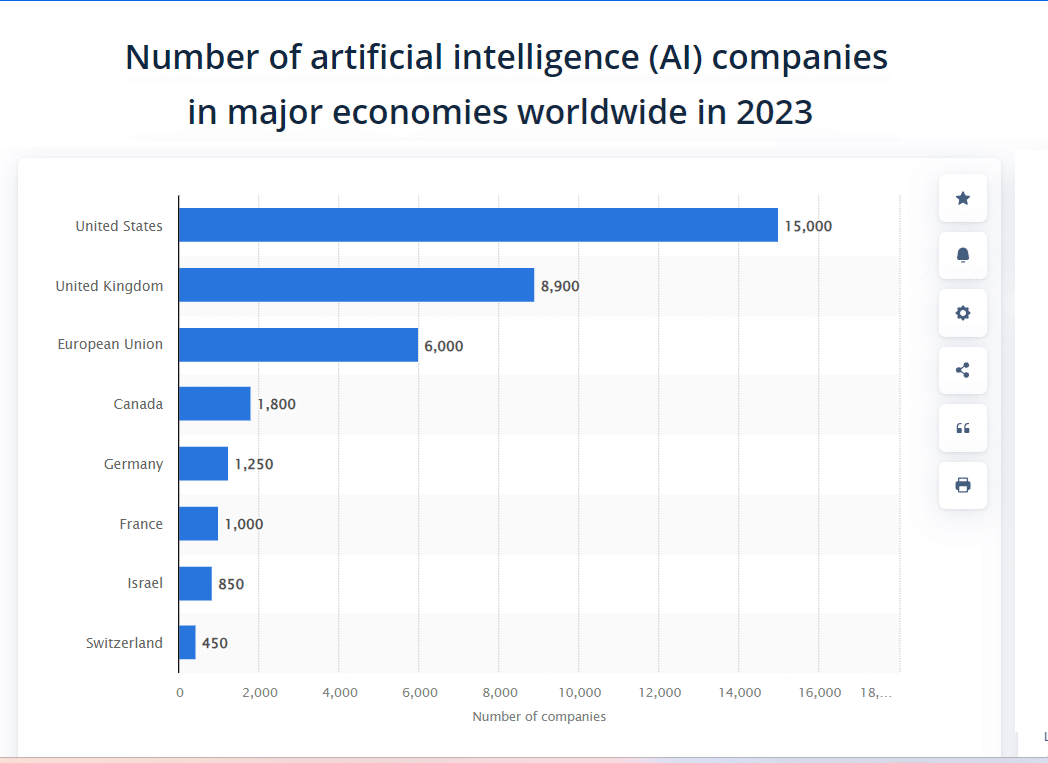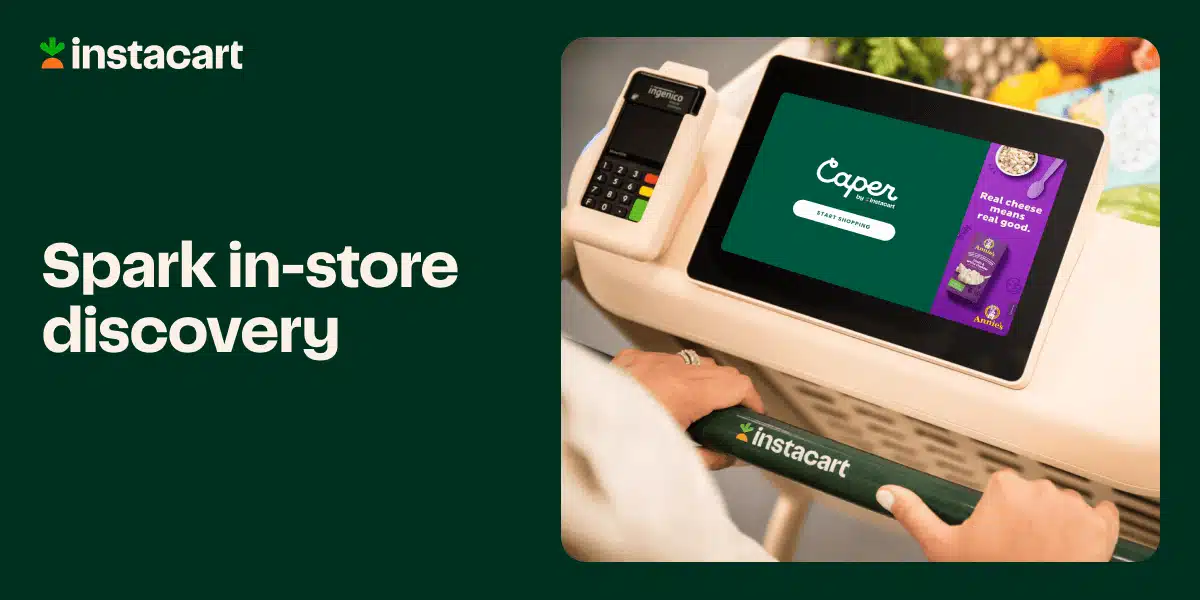Unless you have been living under a rock, you’d know that artificial intelligence (AI) euphoria is taking over the world and the enthusiasm is not merely limited to the investing community. Companies across the spectrum are trying to incorporate AI into their products and services. While some of these sound really helpful and futuristic, others just seem like a brazen attempt to profit off of the AI hype without providing anything useful.
The world’s AI appetite seems far from over and the term is increasingly featuring in the earnings calls of all kinds of companies. Data compiled by FactSet showed that 199 of the 500 S&P 500 companies used the term “AI” in their earnings calls between March 15, 2024 and May 23, 2024. It was a new record and surpassed the previous record high of 182 in Q2 2023.
In the retail industry, many companies are experimenting with AI, especially with smart carts and self-checkouts. Instacart, for instance, is deploying its strange AI-powered Caper Cart to more stores this week.
Instacart is Expanding Its Caper Cart Smart Carts
AI shopping carts may seem like an insane or perhaps just ridiculous idea, but these Caper Carts do have some helpful features. They help shoppers skip the check-out lines and even calculate the total value of all the items in the cart. During the Q1 2024 earnings call in May, Instacart said that it has already deployed these in the “hundreds” across different partners and expects to deploy thousands more by the end of 2024. So don’t be surprised if your next shopping cart is AI-powered.
Instacart’s AI-powered smart carts, which offer real-time recommendations and 'gamified' shopping, are coming to more U.S. grocery stores https://t.co/oUOMTu09Xc #AI #ML #ArtificialIntelligence #MachineLearning #GenAI pic.twitter.com/VFj8p7gSKF
— Evan Kirstel #B2B #TechFluencer (@EvanKirstel) July 9, 2024
The company sees Caper Carts as a key long-term driver and the term featured two dozen times cumulatively during the Q1 2024 shareholder letter and earnings call. Instacart CEO Fidji Simo is quite upbeat about them and said, “We made an early bet that smart carts would be the winning technology for transforming the in-store grocery experience because it’s a form factor people recognize and it doesn’t require retrofitting a whole store with large capex investments.”
This week, Instacart is bringing these Caper Carts to McKeever’s Market & Eatery grocery and Price Chopper.
Is Instacart Taking “AI” Too Far with Its Caper Carts
Caper Carts don’t just bill the items that the shopper has in the cart but also sync the customer’s loyalty accounts. Thereby, it is able to provide them with customized coupons, discounts, and offers – as well as advertisements. Instacart is also working on adding real-time offers based on a shopper’s location within a store.
Caper Carts also have “gamification” capabilities and reward shoppers for meeting some shopping milestones. It also lets users place an order from their in-store basket if the item is out of stock.
According to Instacart, customers using Caper Carts end up purchasing bigger counterparts compared to shoppers who don’t use them. The company sees advertisements as a big moving part of its Caper Carts and said that it could be a new line of business for the retailers deploying them while becoming a revenue source for Instacart.
While some find the Caper Cart a good proposition, not all are convinced. Some shoppers don’t seem too impressed with Caper Carts and some complain of spending equivalent or more time using them as compared to going through the traditional carts and billing process.
Generative AI Misses
Shopping carts aren’t the only unusual thing that companies have tried to imbue with AI for a profit. There have been several major instances when generative AI has missed the mark. In fact, Instacart already blundered with a feature that used generative AI to create images for recipes, leaving users baffled.
A Business Insider report took potshots at some of these images calling out some for inaccuracies. Among others, it listed the image for “Grilled Salmon Ceaser Salad” where lettuce and a slice of lemon were blended to what it termed “create a new type of fruit-and-vegetable hybrid previously not known to man.”
Another once massively hyped tech bites the dust: Amazon’s “Just Walk Out”.
Shades of Cruise, they needed loads of humans behind the scenes 🤷♂️
Breaking news @theinformation
RIP 2018-2024 pic.twitter.com/vcreBT0lAl
— Gary Marcus (@GaryMarcus) April 2, 2024
Amazon, which is otherwise an AI powerhouse, discontinued its Just Walk Out technology in US stores in April. We learned that it didn’t just use AI. Reports said that Amazon employed 1,000 people in India who reviewed the purchases made through Just Walk Out. Amazon called these reports “erroneous” even as it admitted that humans were indeed involved in the review process. It added, “This is no different than any other AI system that places a high value on accuracy, where human reviewers are common.”
Artificial Intelligence is Permeating All Industries
Perhaps one of the strangest intersections with AI are within the sphere of spirituality. For example, the Meadow app in South Korea helps users with customized prayers based on the issues they discuss with the chatbot.
Kim Min-joon, who’s the CEO of Meadow’s parent company Awake said that initially, the company faced pushback from pastors over fears that the company is trying to replace pastors.
He however added, “But pastors began to appreciate our service as it helps them save time in preparing for sermons, and find more time to take care of lonely, troubled followers.”
Meanwhile, AI now seems to be permeating everything – and we have things ranging from AI toothbrushes, AI shoes, AI pillows, AI whiskey, as well as an AI app to detect animal pain.
Is AI a Bubble? Experts Weigh In
As Instacart and countless other tech companies continue to release silly AI features, it’s totally reasonable to ask whether the generative AI hype is all a bubble. Analysts are ringing the alarms, warning of “AI washing” where companies make inflated claims about their AI capabilities – as markets love every utterance of “AI” during earnings calls.
According to Douglas Dick, UK head of emerging technology risk at accountancy giant KPMG, people have different definitions of AI which is leading to AI washing.
He warned, “AI washing can have concerning impacts for businesses, from overpaying for technology and services to failing to meet operational objectives the AI was expected to help them achieve.”
Sandra Wachter, a professor of technology and regulation at Oxford University believes that we are at the “peak of the AI hype cycle.” She added, “We have to move away from this one-sided overhyped discussion, and really think about specific tasks and sectors that AI can be beneficial for, and not just blindly implement it into everything.”
Richard Windsor, veteran tech stock analyst and founder of research firm Radio Free Mobile compared the AI euphoria to the internet in 1999 and autonomous driving in 2017. He provided several examples to illustrate why AI looks in a bubble and said, “Capital continues to pour into the AI sector with very little attention being paid to company fundamentals in a sure sign that when the music stops there will not be many chairs available.”

AI Startups Have Exploded
Indeed, despite the funding winter AI companies seem to face no dearth of capital and according to Crunchbase, AI startups raised a cool $50 billion last year. While OpenAI, Inflection AI, and Anthropic raised billions of dollars each, several small startups also secured funds.
The number of AI companies is also exploding and there are 15,000 such companies in the US alone, followed by the UK which had 8,900 AI companies at the end of 2023. An increasing number of startups are mentioning “AI” in their pitches as investors are willing to pay a hefty premium for companies in that space.
Some point at similarities between Nvidia’s recent price action and Cisco’s right before the dot-com bubble popped, but the numbers simply don’t support the hypothesis (yet, at least).
Nvidia’s rally is backed by commensurate growth in both its topline and bottomline even as concerns linger over the overuse of AI by companies to spur their valuations.
All said, while Nvidia has justified its valuations with stellar earnings growth, most other AI plays still need to monetize their investments and show markets that the billions of dollars they are pouring into the technology would lead to tangible returns on investments.
